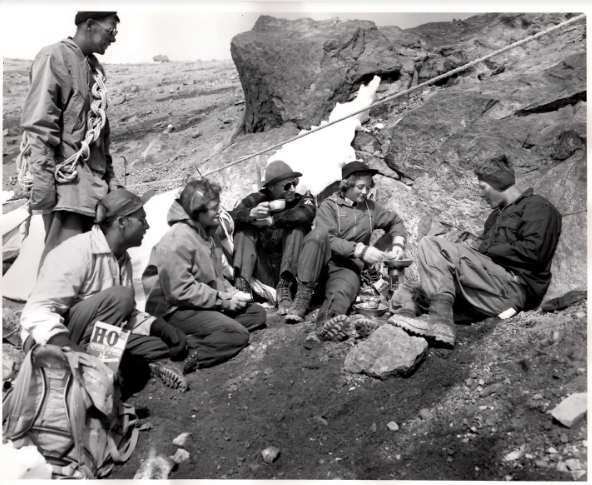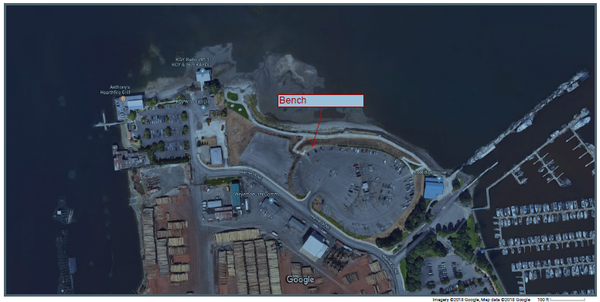
The Olympia Mountaineers invites you to a dedication gathering celebrating Paul Wiseman, the late founder of the Olympia Branch of The Mountaineers who established our branch in 1963 and leaves behind and indelible legacy.
Please join us at the Port of Olympia on Aug 27 at 6pm as we celebrate the installation of a public bench and plaque honoring an integral member of our community. No need to RSVP.

WHO WAS PAUL WISEMAN?
Born and raised in 1912 in Seattle, Paul was exploring the mountains at an early age. The first mountains he climbed were Mount Constitution at the age of 10 and Mount Si at the age of 13. As a Boy Scout, he spent many of his weekends climbing the peaks around Snoqualmie Pass. He was a near life-long Olympia resident after having studied math at Reed College in Portland, and later economics at the University of Washington.
Paul joined The Mountaineers in 1948. Although he had years of early experience climbing in the mountains - including Mount Rainier, Mount Constance, and peaks all over the Olympics and Cascades - he took the basic and intermediate climbing courses in Tacoma. In the photo above, Paul (center with hat and sunglasses) is shown on Mount Rainier in 1953 with a group of skilled, young alpinists who were featured in the second issue of Sports Illustrated, entitled “A Date on Mt. Rainier.”
Over the decades, Paul would go on to lead numerous outings for The Mountaineers locally and internationally, including Austria, Switzerland, Kenya, Egypt, New Zealand, and Fiji.
In addition to climbing and leading trips, Paul made heavy contributions to The Mountaineers in other ways. In 1952, he joined the Board of The Mountaineers, and in 1956, he served as the President. Years later in 1992, he served as chairman of the club’s first history committee.
CONSERVATIONIST AND ENVIRONMENTALIST
Especially in his years on the Board, Paul took an avid interest in conservation and helping to make conservation a top priority of The Mountaineers. On one trip in 1958, he hiked with Supreme Court Justice William O. Douglas and other conservationists along the Olympic Peninsula, protesting a proposed extension of US Highway 101 that would have destroyed parts of Olympic National Park. He became a strong advocate for wilderness conservation in the local community, and served as a board member of the Sierra Club’s Northwest Chapter, and as one of the seven incorporators of The Mountaineers Foundation (now the Keta Legacy Foundation).
FOUNDING OF THE OLYMPIA BRANCH
Although The Mountaineers club had been around since 1906, Paul thought a climbing course would do well in Olympia. He found enough people to start a basic climbing course in Olympia, and so in 1963, with 67 members and one course, the Olympia Branch was born with Paul serving as its first chair. Today, the Olympia Branch has nearly 1,000 members and offers courses and activities in climbing, scrambling, skiing, snowshoeing, hiking and backpacking, sea kayaking, navigation, mountaineering first aid, trail running, naturalist seminars, and conservation stewardship.
PAUL’S LEGACY
As club president, Olympia branch chair, club historian, and trip leader, Paul left behind a rich legacy in The Mountaineers and local community. During his lifetime, his contributions and accomplishments did not go unnoticed. He received The Mountaineers service award in 1964, and the Olympia Branch’s first service award in 1991.
Paul died June 13, 2011, two days before his 99th birthday. He left the bulk of his fortune to Reed College and to The Mountaineers Foundation. His estate also left funds for a memorial to Paul. Eight years ago, the Olympia Mountaineers decided to have a bench in his memory installed at the Port of Olympia that looked toward the Olympic Mountains. The story of the bench that follows involves a whirlwind of ironic events and obstacles that took many years to overcome. As Olympia Mountaineer Mike Riley describes it: “a full telling of this story takes about three beers.”
In May 2018, the Paul Wiseman memorial bench was finally installed, thanks to a few determined individuals.
 Siana Wong
Siana Wong